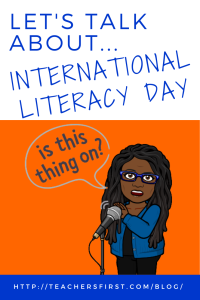We are all worthy of telling our stories and having them heard. We all need to be seen and honored in the same way that we all need to breathe.
Viola Davis
As educators, we are entrusted with shaping young minds, igniting their curiosity, and nurturing their love for learning. On September 8th, International Literacy Day, we’ll have the opportunity to celebrate the transformative power of literacy, champion the cause of education, share our own stories of lifelong learning, and pave the way for a more sustainable and peaceful world. This year’s theme, “Promoting Literacy for a World in Transition: Building the Foundation for Sustainable and Peaceful Societies,” resonates deeply with our roles as educators and advocates for positive change.
The #ImALifelongLearner Campaign: Sharing Our Literacy Stories
Learning is a lifelong journey, and everyone’s journey is different. Imagine a world where every individual can embrace the spirit of lifelong learning. In this world, stories of personal growth through education can inspire others to embark on their journeys of discovery. The #ImALifelongLearner campaign encapsulates this vision, inviting participants to share their unique paths to becoming lifelong learners. Educators have a fantastic opportunity to participate and guide our students in sharing their literacy stories.
Technology offers us innovative ways to amplify our voices and reach a global audience. Here are some tech-integrated ideas to help you and your students create and share your literacy stories:
- Digital Storytelling Platforms: You and your students can leverage platforms like Microsoft Sway (reviewed here), Canva (reviewed here), Adobe Express (reviewed here), or even Book Creator (reviewed here) to create visually engaging narratives. Combine text, images, and even short videos to depict your literacy journey, sharing how reading opened new worlds for you. Post the story on social media using #ImALifelongLearner to motivate other life-long learners to share their stories.
- Annotated Images: Share your story through an annotated image using a tool like ClassTools (reviewed here) or Genially (reviewed here). Upload a picture representing your literacy story and add captions, callouts, videos, and voiceovers explaining your literacy motivations and milestones. Use them to create an online gallery using Padlet (reviewed here), where students post their images and give one another feedback about their literacy journeys.
- Podcasts: Take advantage of Vocaroo (reviewed here) or Zencastr’s (reviewed here) simplicity to recount your literacy story. Let your voice convey your passion for reading and writing. You can also create your account as a podcast episode, incorporating sound effects and background music to enhance the storytelling experience. Encourage your students to do the same, honing their communication skills. Take it further and develop a class podcast with students taking turns sharing literacy reflections.
- Interactive Blogs: Telegra.ph (reviewed here) will allow you to craft an interactive blog post with hyperlinks to resources, books, or articles that influenced your learning journey. This approach shares your story and provides valuable resources for your readers. Telegra.ph makes an easy instant blog post that your students can use without creating an account.
- Animated Videos: Use platforms like Animatron (reviewed here), Moovly (reviewed here), or Powtoon (reviewed here) to create animated videos that add a fun and engaging dimension to your literacy story.
Another way to participate in the celebration
Use resources such as this topic in Microsoft Flip to educate your students about Sustainable Development Goal 4, which aims to ensure inclusive and equitable quality education for all by 2030. Have students use Big Huge Labs (reviewed here) to make posters, ClipChamp (reviewed here) to make videos, or Pablo (reviewed here) to make social media images in support of the goal. Post them using the hashtag #SDG4. Show your students that their actions can raise awareness about the 774 million youth and adults worldwide who lack basic literacy skills.
Let’s all unleash our creativity and voices to share our literacy stories this International Literacy Day. As educators, we can empower generations of passionate, life-long learners through diligence and care.


